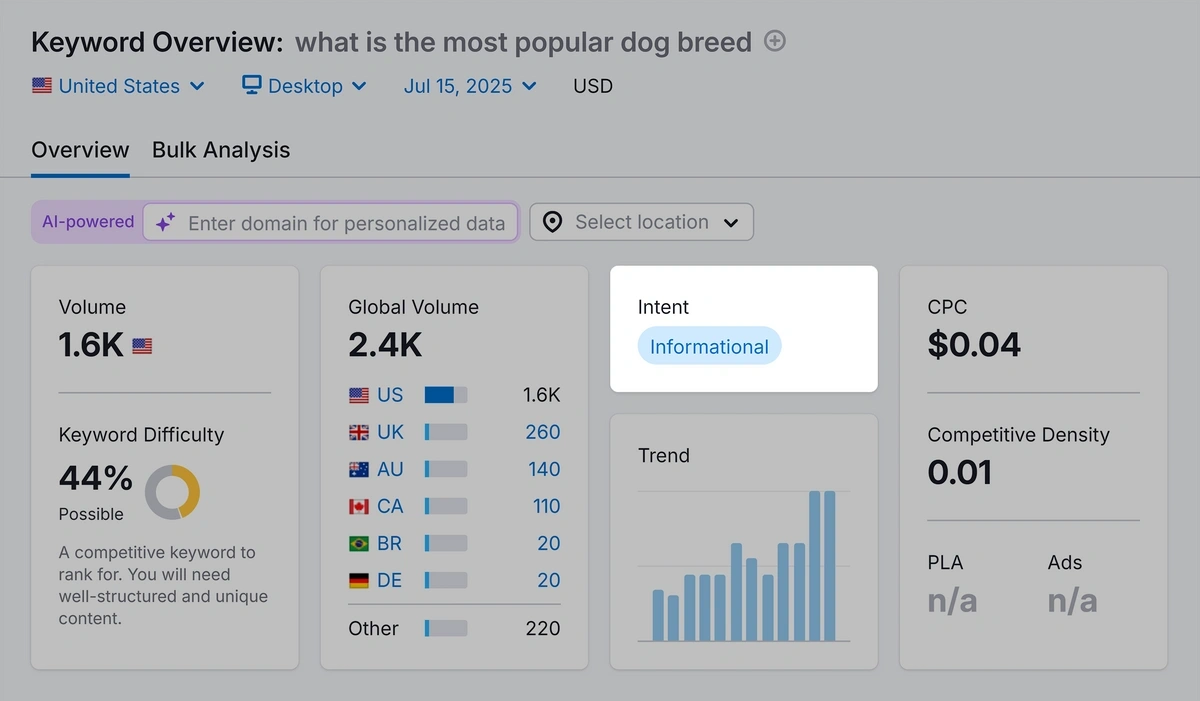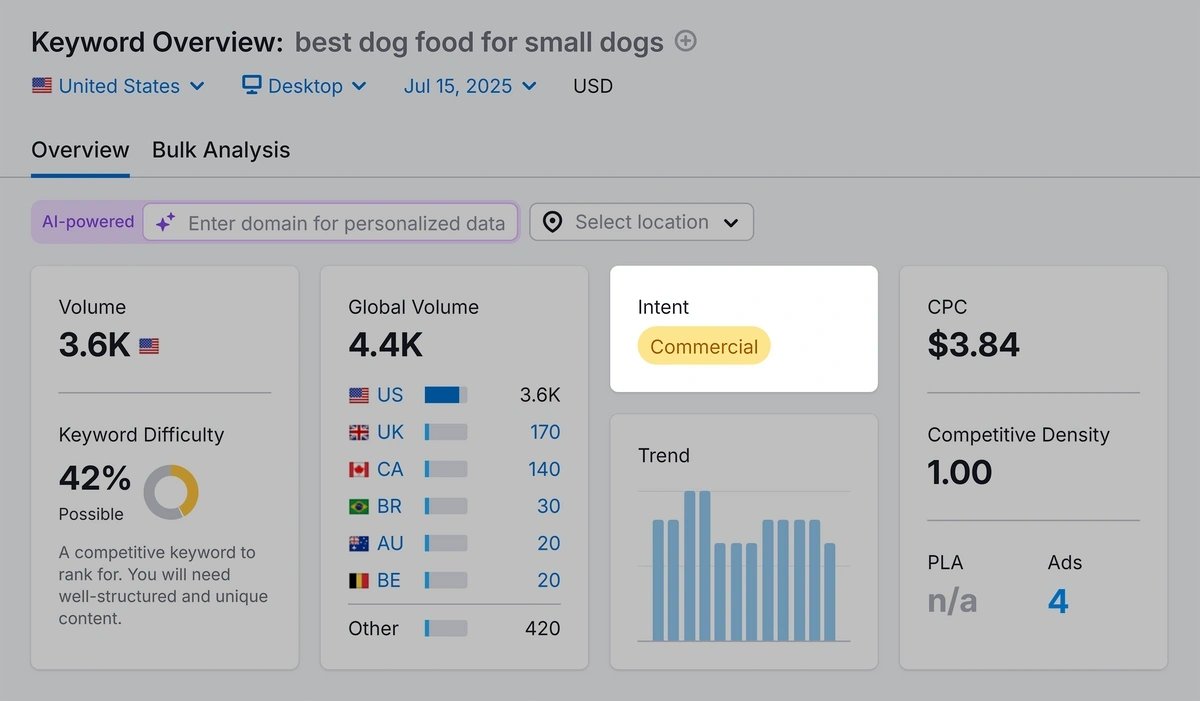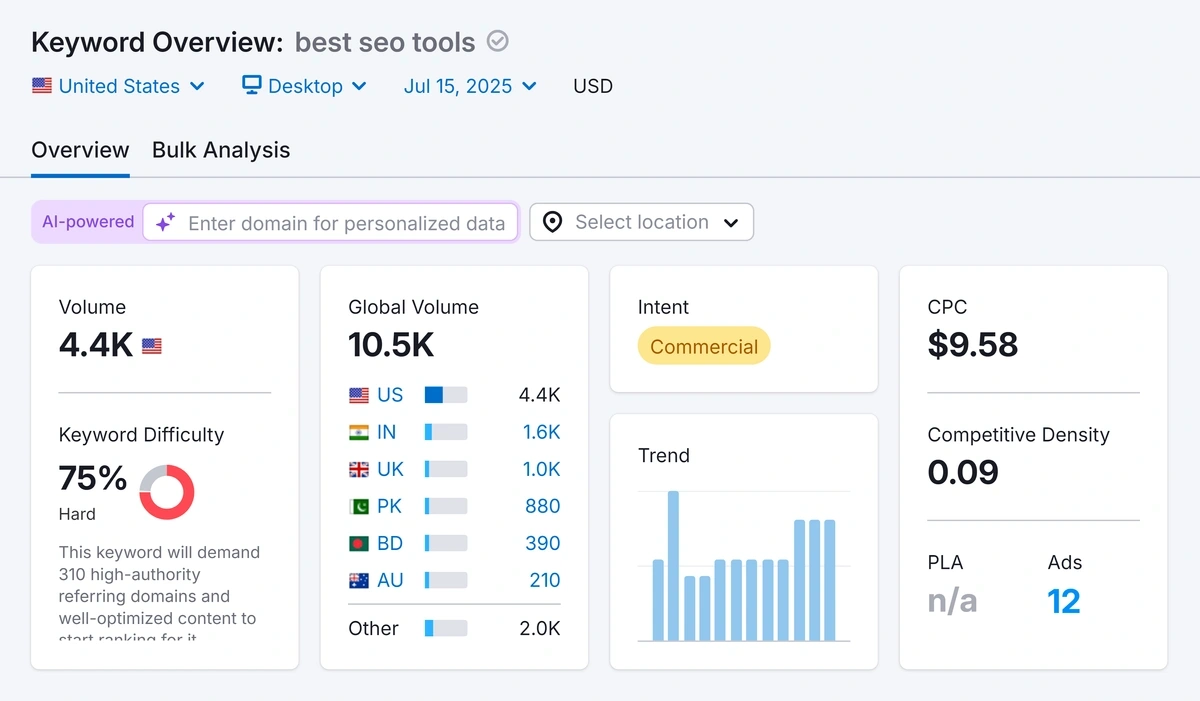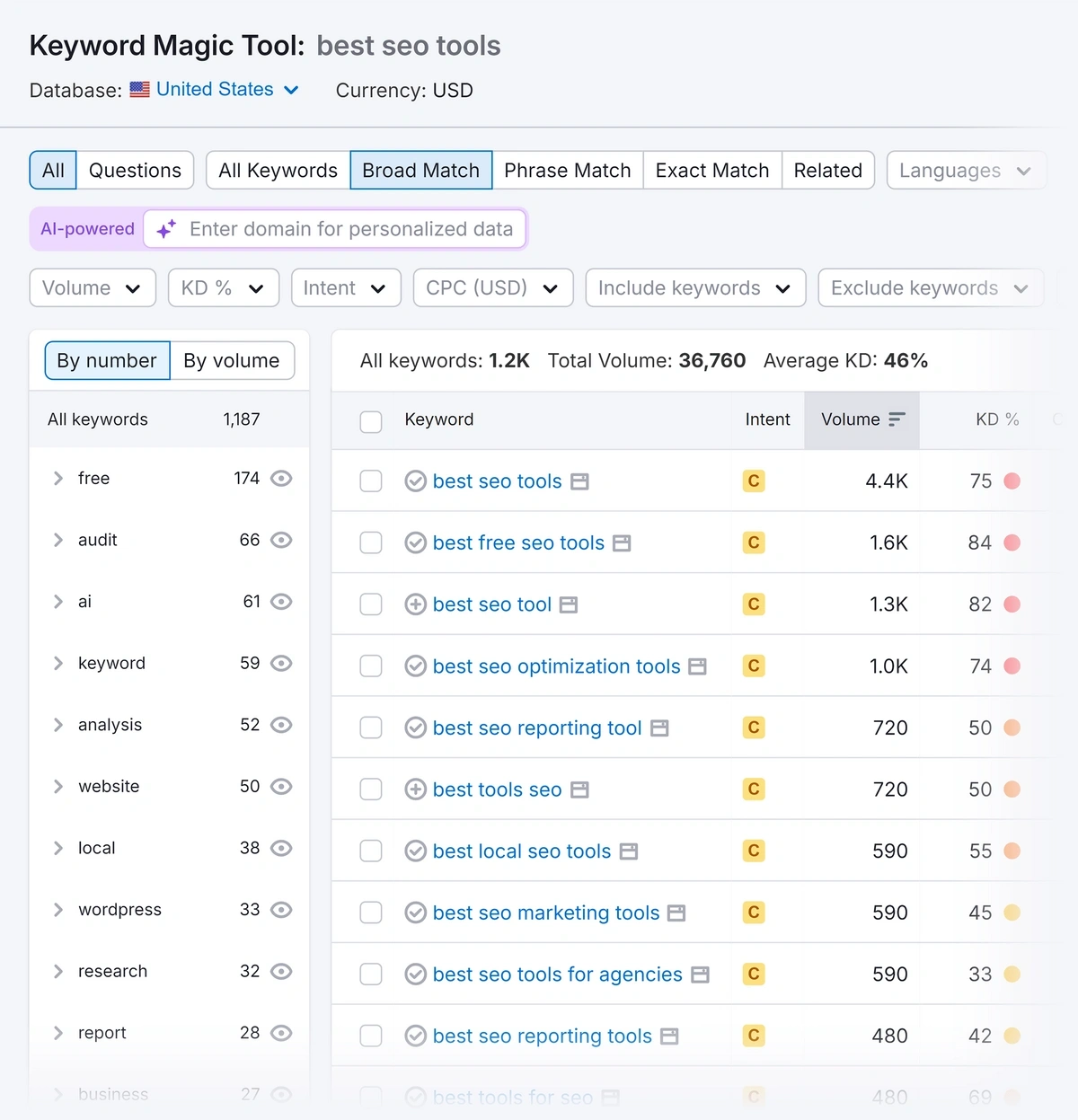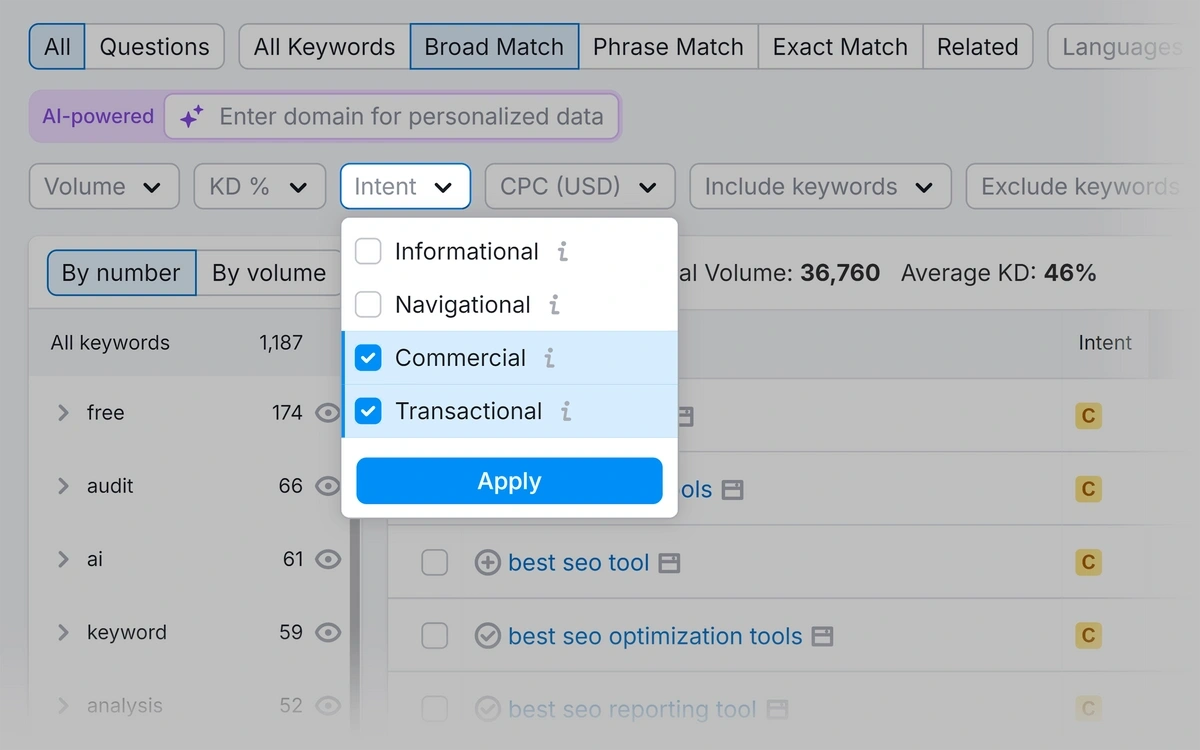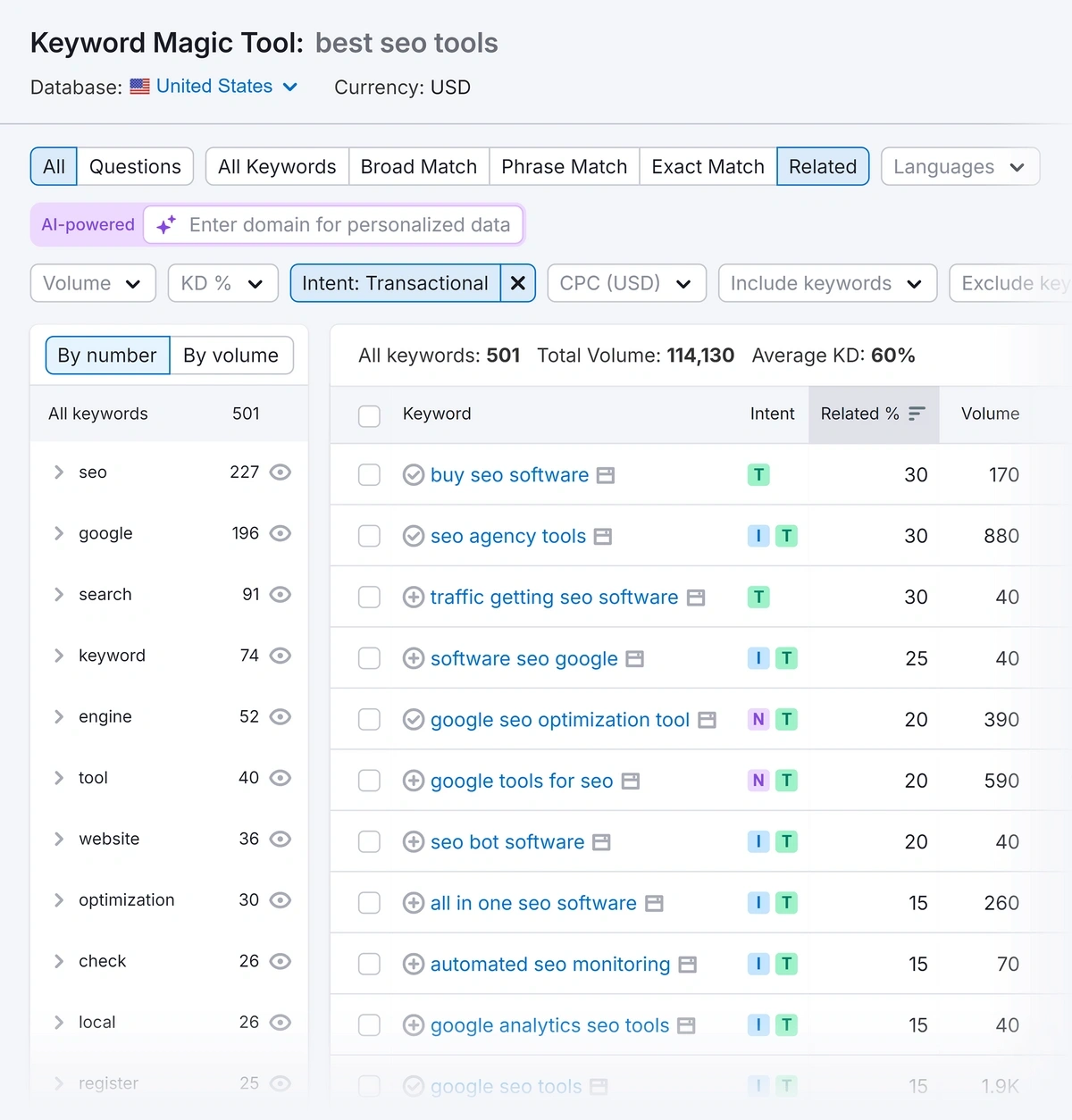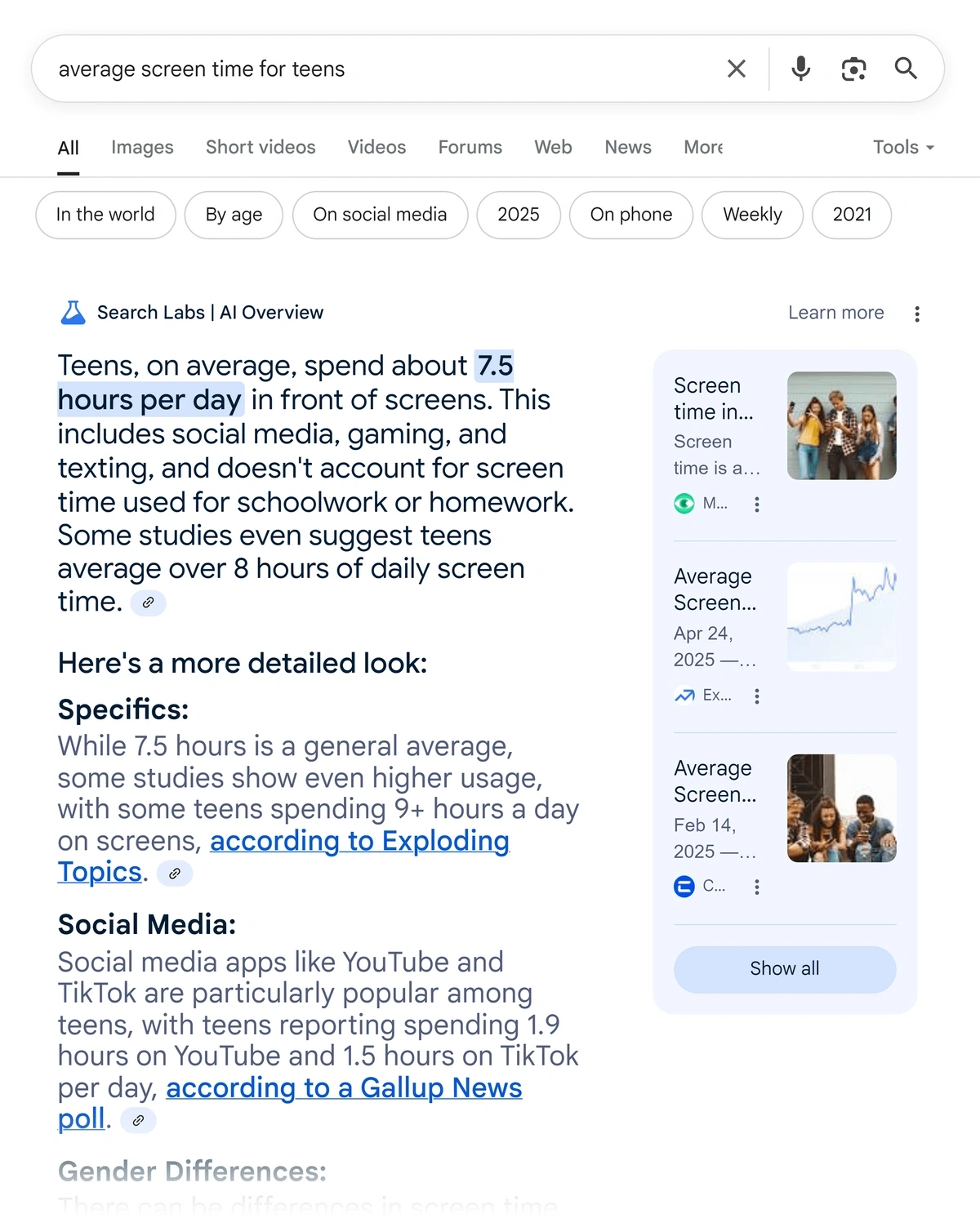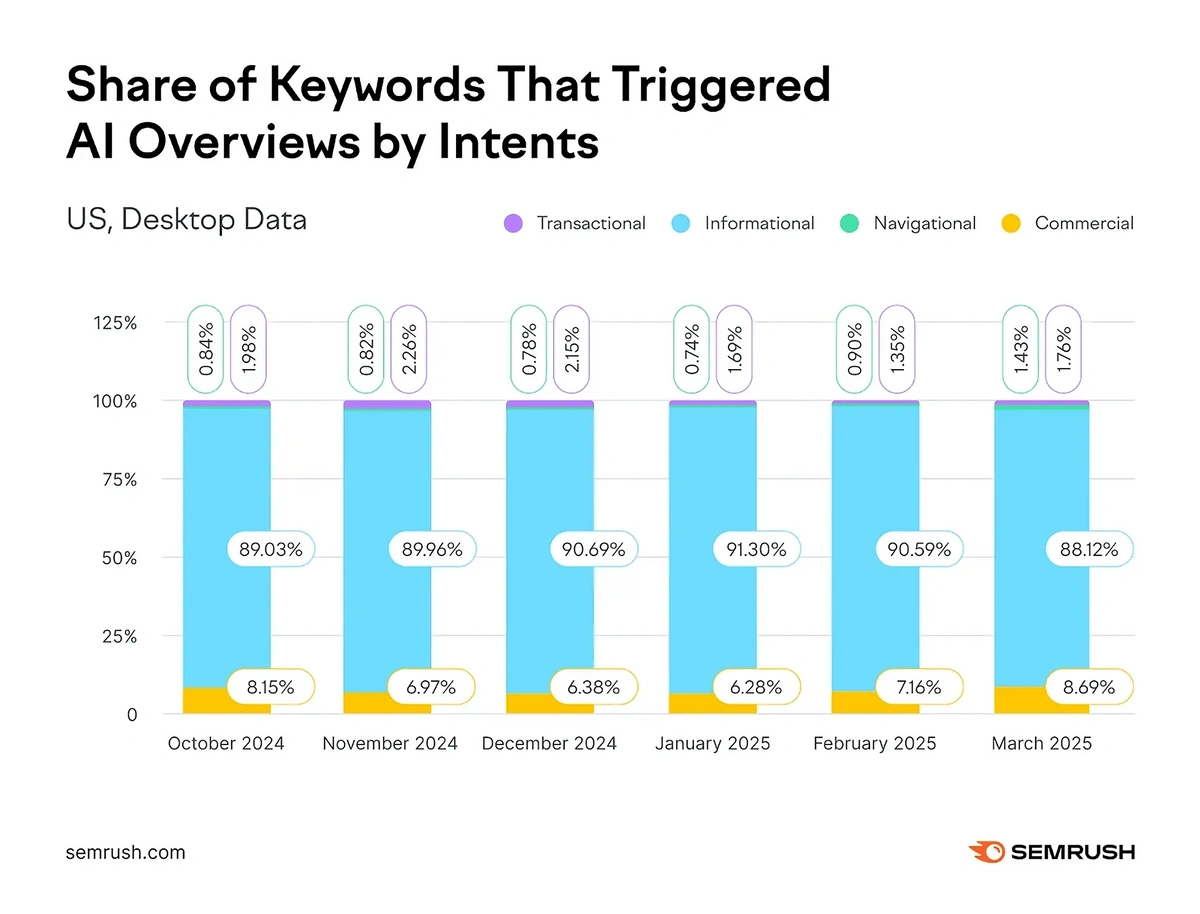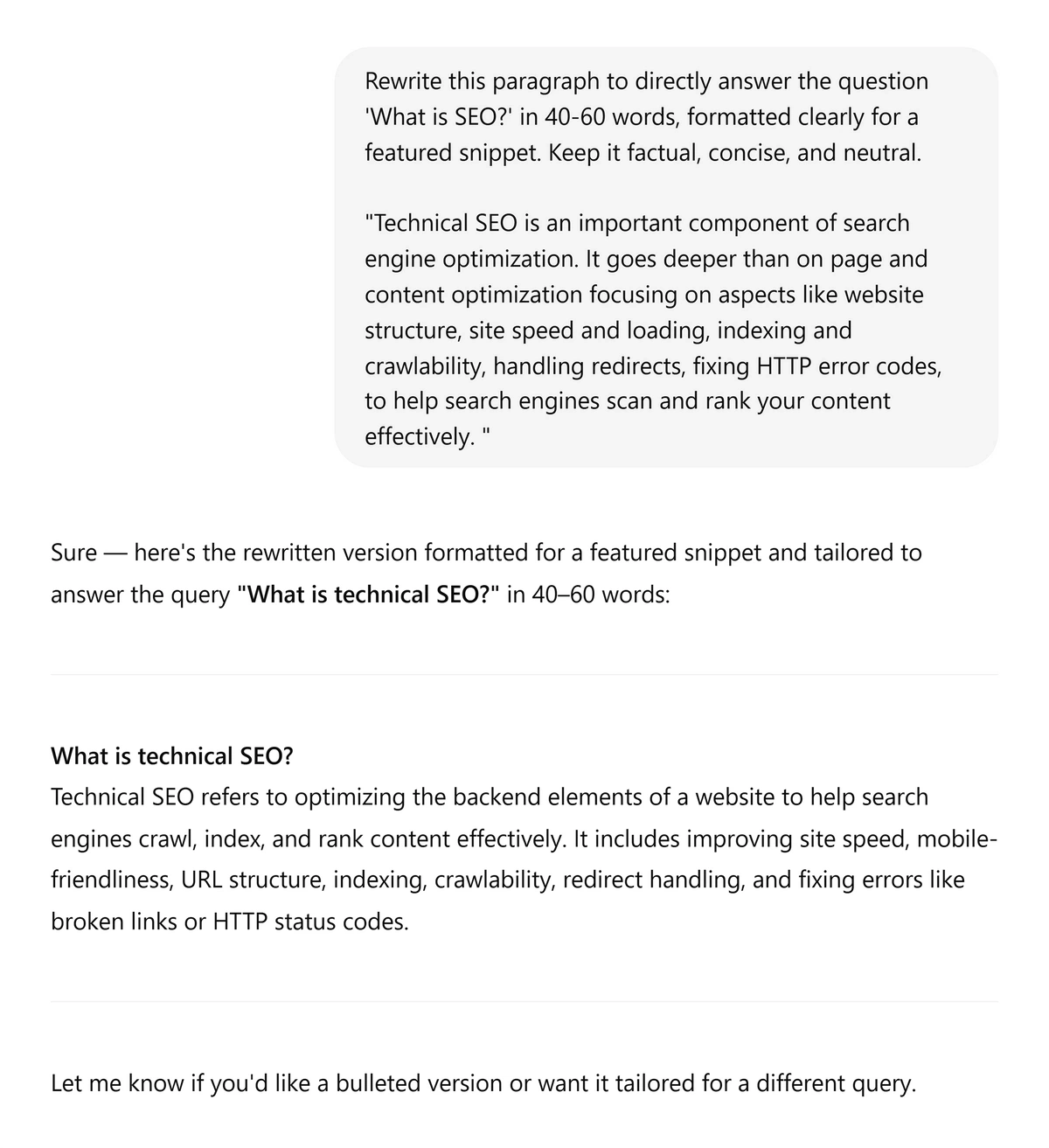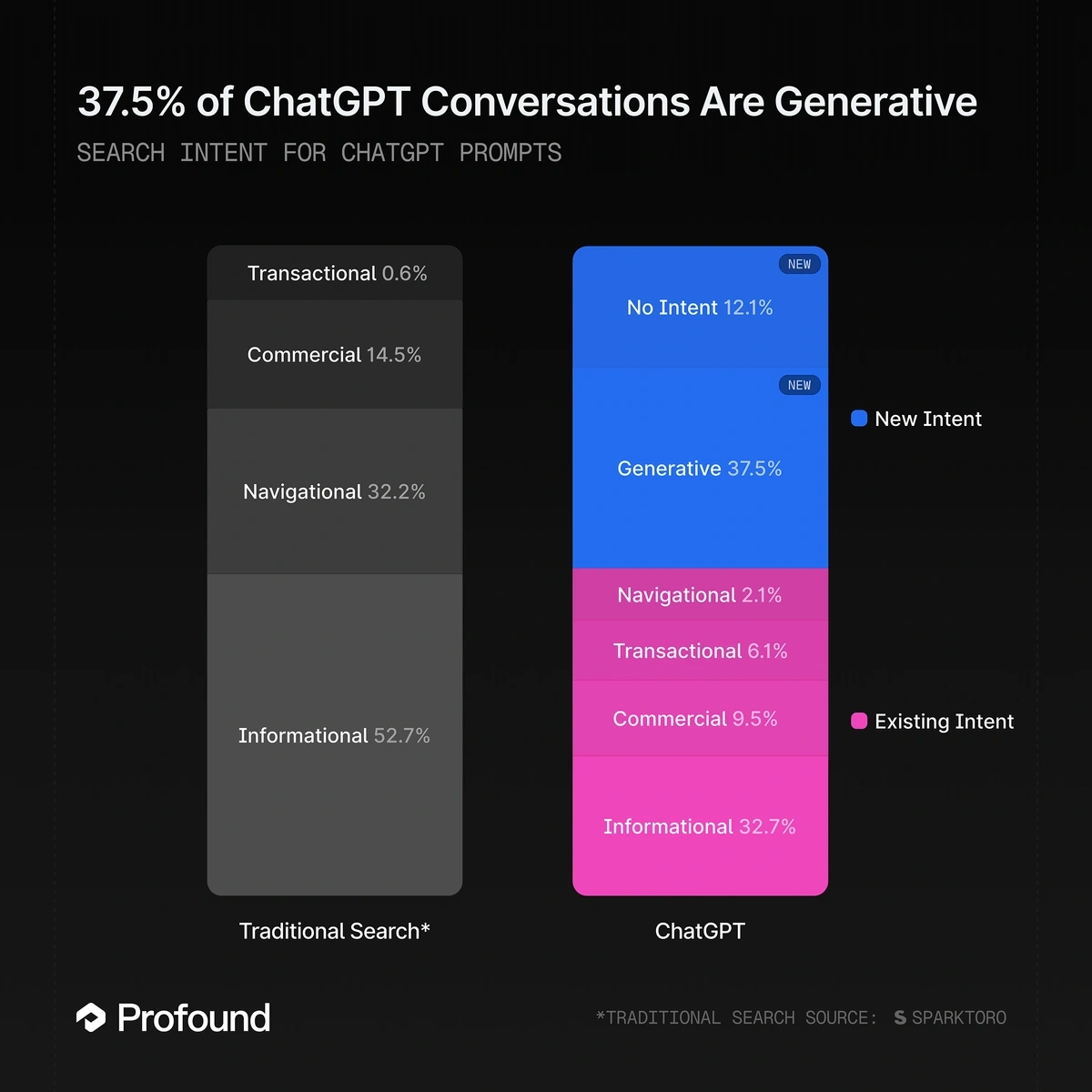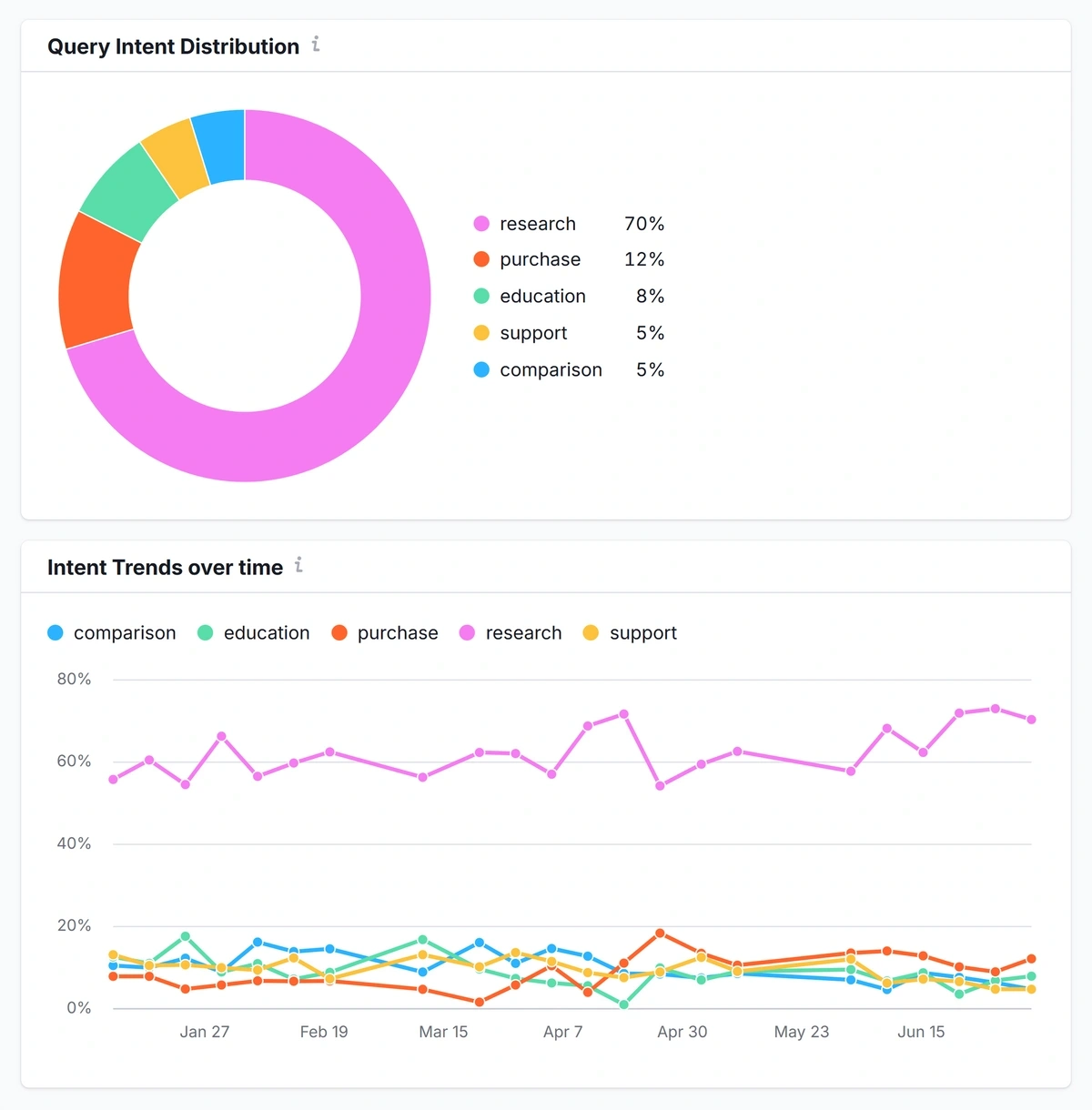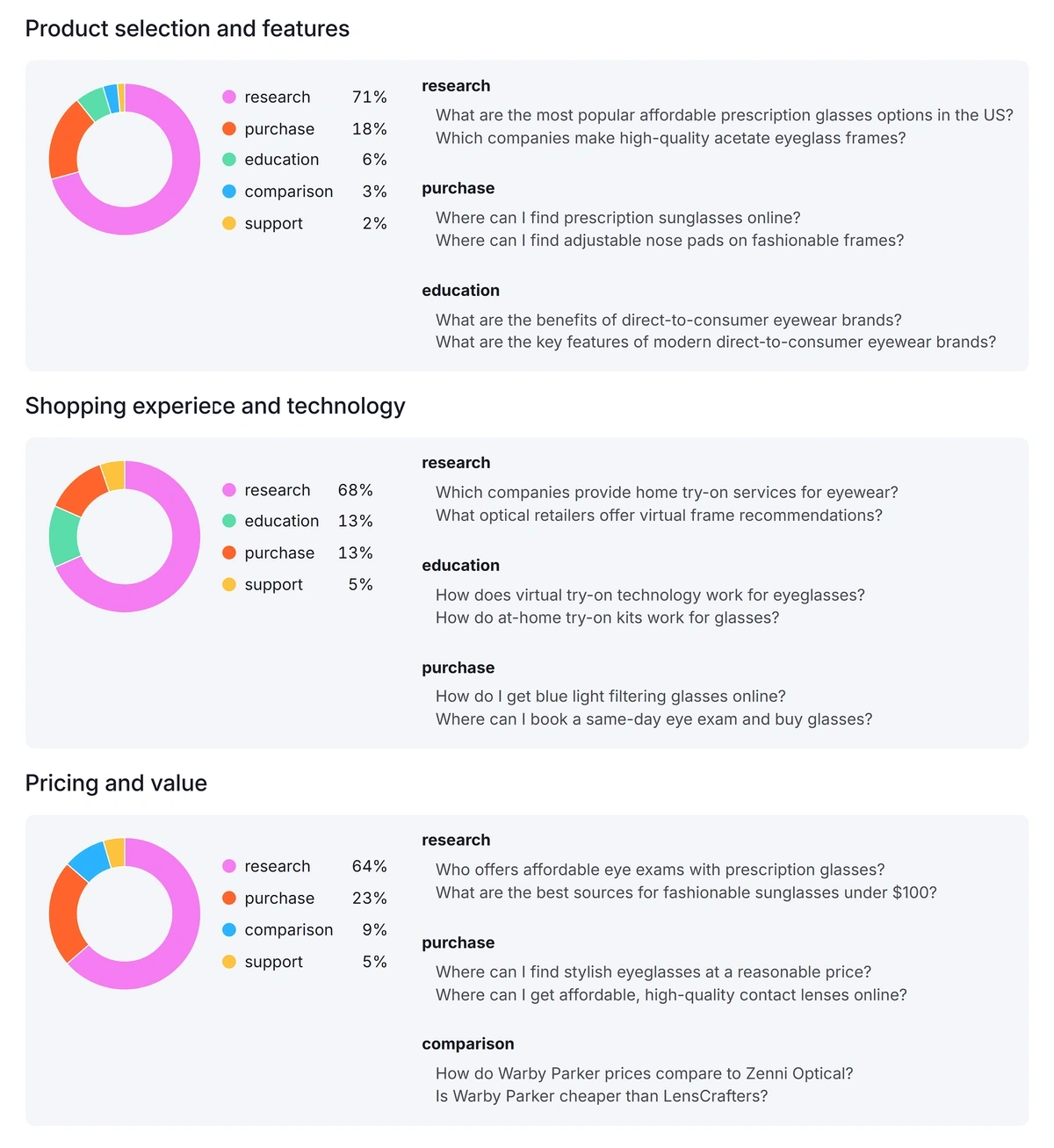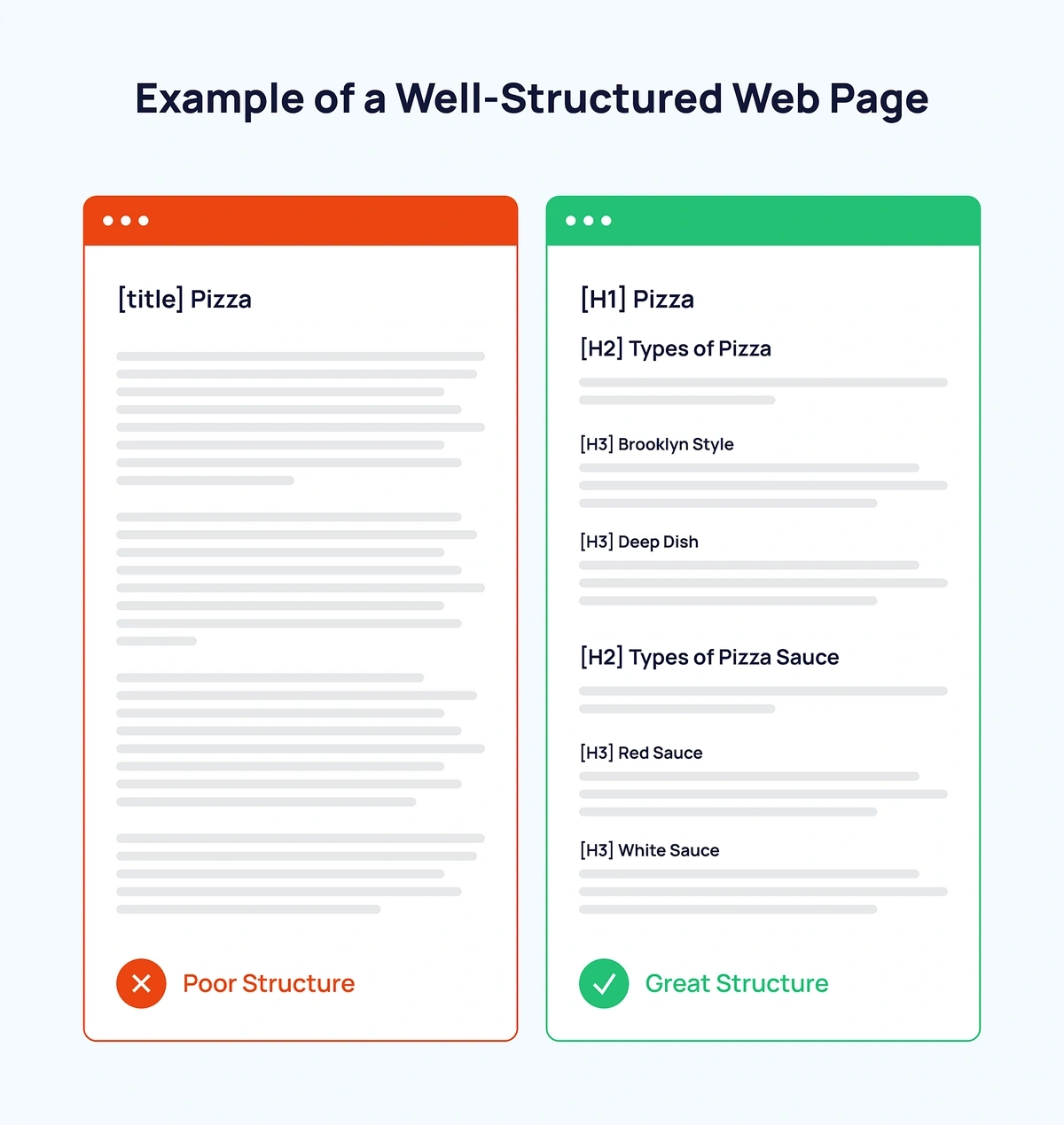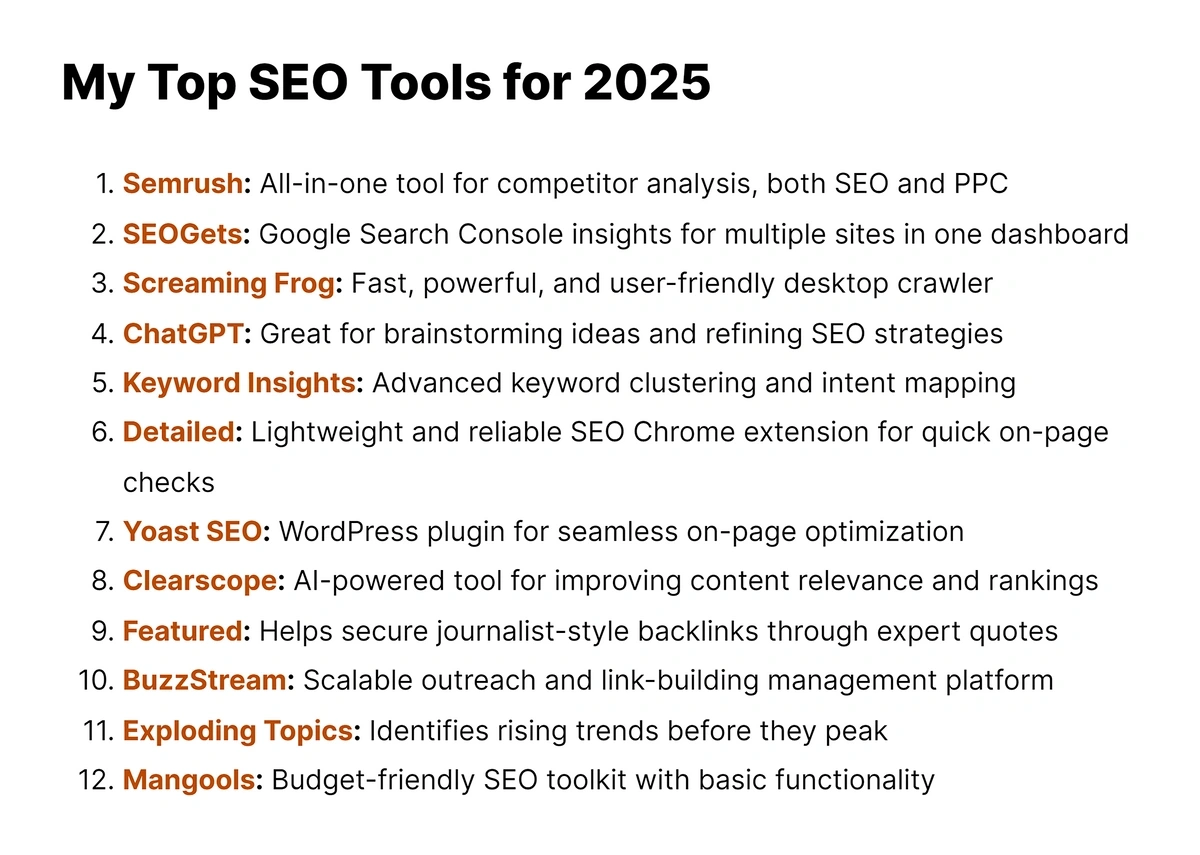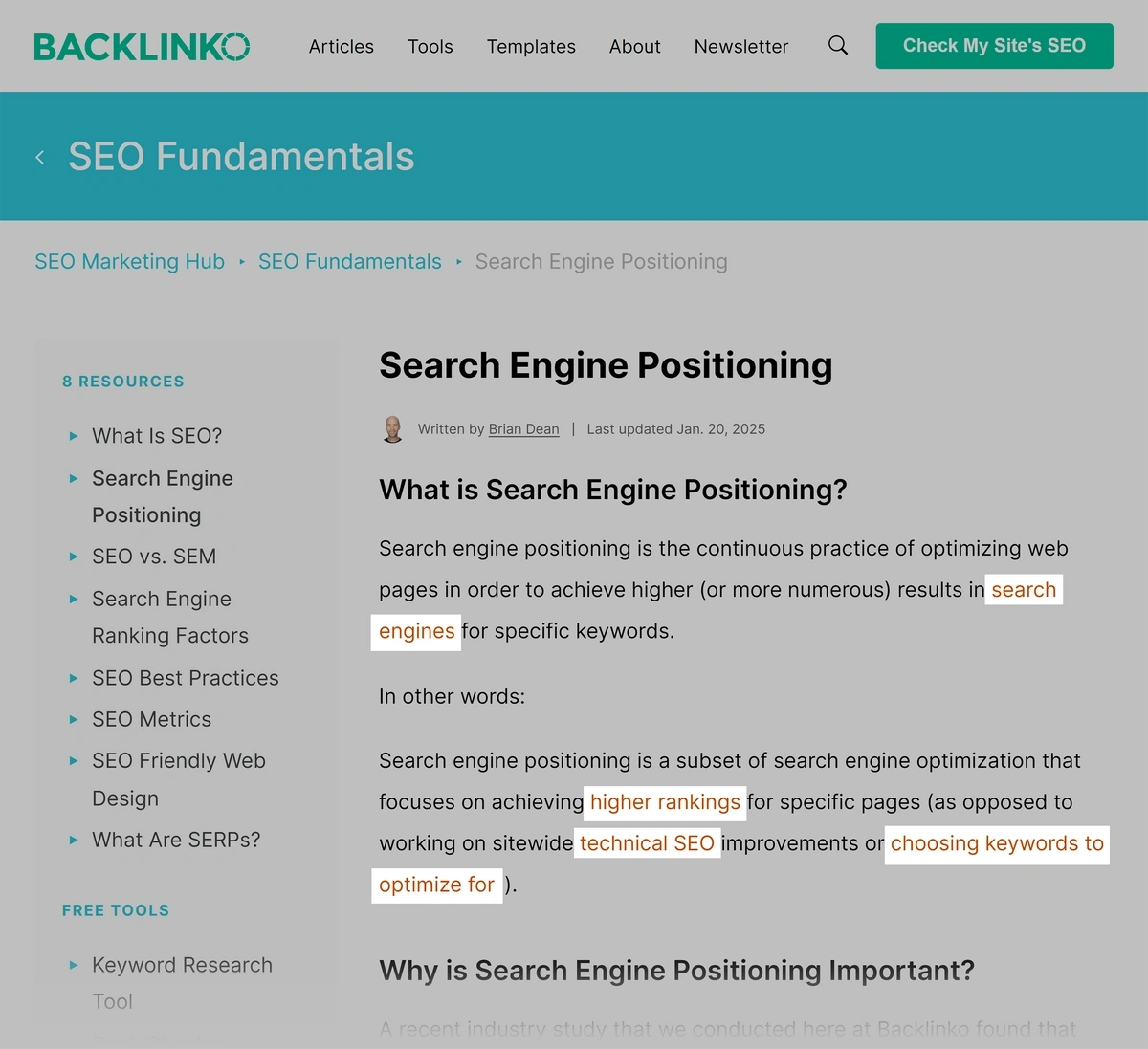Get Advanced Insights on Any Topic
Discover Trends 12+ Months Before Everyone Else
How We Find Trends Before They Take Off
Exploding Topics’ advanced algorithm monitors millions of unstructured data points to spot trends early on.

Keyword Research
Performance Tracking
Competitor Intelligence
Fix Your Site’s SEO Issues in 30 Seconds
Find technical issues blocking search visibility. Get prioritized, actionable fixes in seconds.
Powered by data from
What Is Keyword Intent? (+ How AI Is Changing Search Intent)
There’s one SEO technique I’ve used throughout my career that consistently delivers results: paying attention to keyword intent.
Keyword intent, also called search intent, is the reason or motivation behind the query a person types into a search engine.
If your target keyword is what people are searching for, that keyword’s intent is why they are searching for it.
Get More Search Traffic
Use trending keywords to create content your audience craves.
It’s important to understand keyword intent because it provides insight into the best way to answer users’ questions. It also helps your content rank higher by:
- Meeting Google’s recommendations for “helpful content”
- Providing information users want to read, which increases engagement and time on page
- Increasing your chances of appearing in SERP features like featured snippets, AI Overviews, and product carousels
When you put yourself in the shoes of the people searching for your target keyword, your content naturally becomes more helpful and engaging. In my experience, when you build your content on a foundation of the right keyword intent, all the other SEO puzzle pieces fall into place.
What Are the 4 Types of Search Intent?
There are four traditional types of search intent:
- Informational
- Commercial
- Transactional
- Navigational
You can generally sort keywords into one—or sometimes two—of these categories.
Informational Keyword Intent
Keywords with Informational intent indicate that the user wants to learn more about a topic.
They’re often formatted as questions like:
- “what is the most popular dog breed”
- “where do gorillas live in the wild”
- “who is aubrey plaza”
However, sometimes the question is implied. Other examples of Informational keyword intent include:
- “seo checklist”
- “oil change tutorial”
- “fish care”
How do I create content for Informational keywords?
When creating content around Informational keywords, focus on building your topical authority and trust with your audience rather than trying to convert them. People searching with Informational intent are usually very early in the buyer journey and not ready to make a purchase.
Commercial Keyword Intent
Commercial intent refers to the next step in the buyer’s journey. People searching for these types of keywords are trying to learn more about a specific product or type of product before choosing one to commit to.
Examples of Commercial intent keywords include:
- “best dog food for small dogs”
- “semrush review”
- “chacos vs tevas”
- “gaming computers”
- “caffeine free green tea”
Commercial keywords may be branded (like “semrush review” and “chacos vs tevas”) or unbranded.
How do I target Commercial keywords?
You can target Commercial keywords both in blog posts and on product landing pages. Users searching for these terms are interested in making a purchase, so you should optimize your content for conversions as well as search.
Showcasing first-hand experience with the product is extremely important for Commercial keywords. Highlighting real user reviews or testimonials is usually a smart strategy.
Transactional Keyword Intent
Transactional keyword intent is similar to Commercial intent, but the user is done comparing options and ready to make a purchase now.
Some examples include:
- “order pizza delivery”
- “buy concert tickets”
- “semrush free trial”
- “brooklinen coupon codes”
Like Commercial keywords, Transactional keywords may be branded.
How do I target Commercial keywords?
You can target Commercial keywords on product pages, sign up pages, or other landing pages where leads might convert.
Transactional keywords are also useful for PPC ad campaigns. Because users searching for these terms are likely to make a purchase, they’re usually a safer investment than other types of keywords.
Navigational Keyword Intent
Lastly, Navigational keyword intent refers to terms users search for when they’re trying to get to a specific website page.
For example, “semrush login” or “exploding topics blog.”
How do I target Navigational keywords?
Think carefully before targeting Navigational keywords. They’re almost always branded, which means they have low keyword difficulty scores in a keyword difficulty checker.
But users searching for these terms are usually looking for something very specific and are unlikely to make a purchase.
How to Find High Intent Keywords
“High keyword intent” is another way of saying “high buyer intent.” This term refers to Transactional or Commercial keywords that indicate a customer is very likely to make a purchase.
Ranking for high intent keywords can help drive more conversions for your business.
A bit of logic and reasoning might give you a pretty good idea of the intent for a certain keyword. But you don’t have to guess—you can easily find high intent keywords using Semrush.
Verify Keyword Intent in the Semrush Keyword Overview Tool
If you have a specific keyword in mind and you want to confirm its search intent, you can use the Semrush Keyword Overview tool to check.
Type your keyword in and look under Intent at the top of the results page.
That’s it! This is a simple solution if you already know a keyword you want to target and just want to check the intent.
If you need to find a keyword, Semrush can help with that, too.
Find High Intent Keywords With the Semrush Keyword Magic Tool
To find high intent keywords around a certain topic, I recommend the Keyword Magic tool.
Type in your primary keyword, then look at the variations on the results page.
Take notice of the Intent column.
To focus on high intent keywords, I use the filters at the top of the table. There’s one for Intent that lets you check boxes for Informational, Navigational, Commercial, and/or Transactional intent.
Once you apply your filter, you’ll only see keywords with the intent you’ve specified.
For my example keyword, “best seo tools,” all the broad match keywords came back as having Commercial intent. I was able to find some Transactional keywords by broadening my results to related keywords.
Keep in mind that, ideally, you want your content strategy to include content optimized for Informational, Commercial, and Transactional keywords.
Some brands have decided to stop investing in Informational content because of AI search.
But SEO expert Aleyda Solis believes that building topical authority through Informational content is just as important as converting leads with Transactional content.
Aleyda posted about this on LinkedIn:
“If you want to get more *meaningful* visibility in AI search -the one that will ultimately translate in conversions, and yes, also traffic, as well as citations, it's time to invest in in-depth, useful resources, solving common and/or complex issues related to your business arising during your audience decision making and buying journey.”
How Is AI Changing Search Intent?
AI is fundamentally changing SEO. And AI search has had a significant impact on search intent.
LLMs provide users with new ways to ask for and access information. This means you might need to change how you optimize your content to better match new types of search intent that are emerging.
How Does Search Intent Impact AI Overviews?
AI Overviews have heightened zero-click search and made SERPs even more competitive. Having your content cited by an AI Overview can provide a huge boost in visibility for your brand, while failing to appear in one may mean your content isn’t seen at all, even if it’s ranking well in traditional search results.
Search intent is one of the greatest indicators of whether a keyword will have an AI Overview. According to Semrush’s study on AI Overviews, 88.1% of AI Overviews are for Informational keywords. Commercial keywords are the next most likely to trigger an AIO—8.69% of keywords that display one have Commercial intent.
So, if you want to focus on optimizing your content to appear in AI Overviews, you should target more Informational keywords.
On the flip side, if you’re targeting a Transactional or Commercial keyword, you may be better off optimizing for traditional search results or SERP features like featured snippets.
What Is Generative Intent?
LLMs are capable of a lot of things that search engines aren’t. Understandably, this means that users interact with them in new and different ways.
Semrush did some research on ChatGPT search and found that only 30% of ChatGPT queries fit into one of the four traditional search intent categories.
Semrush categorizes the other 70% of queries as having “unknown” search intent, but proposes a possible purpose for these prompts: “creation, conversation, and critical thinking facilitated by AI.”
Another name for this type of query intent is “generative intent.” These are prompts that ask LLMs like ChatGPT to produce or synthesize content.
Some examples of generative intent prompts would include:
- Summarize this text…
- Create an image based on this description…
- Write an email in response to this message…
- Create an itinerary for a trip to New York City…
- Help me brainstorm ideas for new blog posts…
Profound estimates that generative intent accounts for 37.5% of all ChatGPT prompts.
People using these types of prompts aren’t looking for ChatGPT to send them to a website, but you may be able to influence the answer, or be referenced in the sources, if you optimize content for AI search.
How to Analyze AI Query Intent With Semrush
Fortunately, some LLM queries may suggest your brand to users and direct them to your content.
Using the Semrush AI Visibility toolkit, you can see a breakdown of your site’s AI query intent to better understand what AI search users are looking for.
Open up the AI Visibility toolkit and go to the Questions section. Under Current Questions Analysis, you’ll see a breakdown of your overall query intent.
If you continue scrolling, you’ll see more detailed query intent breakdowns by topic, along with examples of prompts for each type of intent.
Semrush has listed some new keyword intents here, including:
- Education: Most similar to Informational keyword intent, although it may incorporate some Commercial queries as well
- Research: Broader questions that have overlap with both Informational and Commercial search intent
- Comparison: Commercial queries that ask LLMs to compare two or more brands
- Support: A unique search intent that may have once been solved by Navigational keywords directing users to customer support, but now provides answers to questions directly in the chat
- Purchase: Indicates a user wants to make a purchase similar to Transactional keywords, but may be more generalized like Commercial keywords
As you can see, there are similarities to the four traditional keyword intents, but they’re slightly more specific.
This gives you more insight into what users might want to get out of your content so you can better optimize it for AI search engines.
How to Optimize Your Content for Search Intent
Once you’ve chosen a keyword, you can start creating content with its search intent in mind.
The first thing I think about when creating content for a certain search intent is the post’s structure. I try to think about the reader’s experience and what they want to know.
For example, let’s consider the keyword “best seo tools.”
The keyword has Commercial intent, so the reader is most likely looking for information that will help them choose a product to buy, not for general information about what SEO tools are or why you might want to use one.
Instead of front-loading the post with background information on SEO tools, I would lead with the list of tools I want to recommend. If readers have to scroll for a long time to get to the information they’re actually looking for, they’re more likely to leave your site and look elsewhere for answers.
You can see that, after a brief introduction, Backlinko lists all recommended SEO tools and a brief description. This meets the needs of a searcher looking for a Commercial intent keyword.
The other component I pay extra attention to when optimizing for search intent is my CTAs. In order to write a compelling CTA, you have to understand the reader’s mindset.
A “Buy Now!” CTA isn’t likely to perform well in a blog post targeting an Informational keyword. The reader isn’t interested in making a purchase. They want to understand a concept.
You’d be more likely to succeed by offering an e-book download, or asking readers to sign up for a webinar or your email list. These all offer more knowledge, which is what they’re already looking for.
Again, Backlinko has catered to keyword intent with its article on search engine positioning, which is an Informational keyword.
For this keyword, the page contains links to more information above the fold:
Put Keyword Intent at the Center of Your SEO Strategy
There are dozens of things to consider when creating and optimizing content. You want it to be visible in search results, but you have to appeal to human readers, too, not just Google and LLMs.
Thinking about search intent helps you step into your readers’ shoes. It makes it easier to write content that’s engaging and craft CTAs that resonate with where readers are in the buyer’s journey.
Semrush is my favorite keyword research tool, and it makes determining a keyword’s intent super easy, for both traditional search and AI search. You can try Semrush for free and gain insight into your readers’ motivations today!
Stop Guessing, Start Growing 🚀
Use real-time topic data to create content that resonates and brings results.
Exploding Topics is owned by Semrush. Our mission is to provide accurate data and expert insights on emerging trends. Unless otherwise noted, this page’s content was written by either an employee or a paid contractor of Semrush Inc.
Share
Newsletter Signup
By clicking “Subscribe” you agree to Semrush Privacy Policy and consent to Semrush using your contact data for newsletter purposes
Written By


Molly is a technical content writer with a passion for making technology easy for anyone to understand. She specializes in content... Read more




